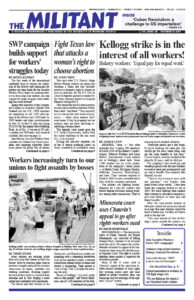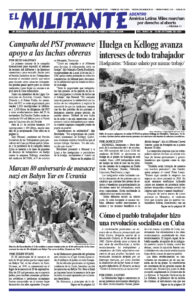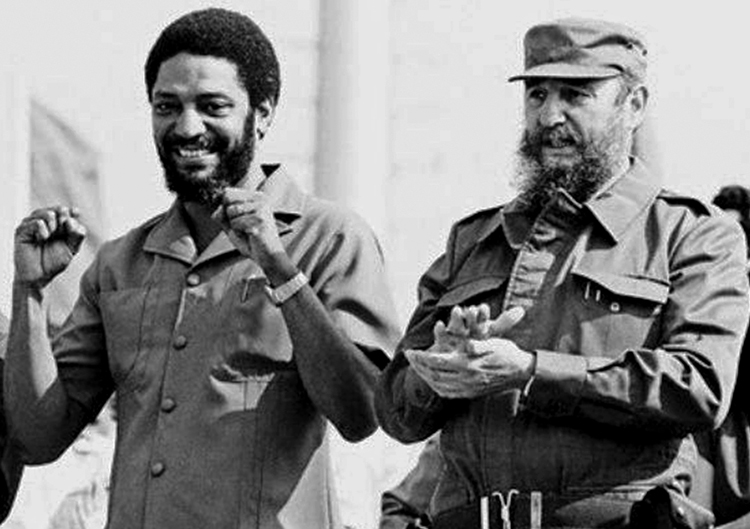To commemorate the 1979-83 Grenada Revolution, which was overthrown by a Stalinist coup led by Bernard Coard in October 1983, we are running excerpts from “The Second Assassination of Maurice Bishop” by Steve Clark, a leader of the Socialist Workers Party. Bishop, a central leader of the revolution on this small Caribbean island, was murdered in the coup. The article is from New International no. 6, a magazine of Marxist politics and theory. Copyright © 1987 by New International. Reprinted by permission.
In mid-October 1983 a faction led by Deputy Prime Minister Bernard Coard in Grenada’s army, government, and New Jewel Movement (NJM) overthrew the workers’ and farmers’ government brought to power by the March 13, 1979, revolution.
Prime Minister Maurice Bishop, backed by other NJM leaders and the overwhelming majority of the island’s workers and farmers, resisted this counterrevolution and attempted to reverse it. On October 19 the Grenadian people launched an uprising to restore their government to power. They shut down workplaces, poured into the streets of the capital, St. George’s, and freed Bishop, who had been placed under house arrest by the Coard faction. Estimates of the crowd range from 15,000 to 30,000 — equivalent for that island of 110,000 people to an outpouring of 35 to 65 million in the United States.
Troops loyal to Coard’s faction turned their guns on the mass demonstration, killing many participants and wounding others. They assassinated Maurice Bishop and five other revolutionary leaders — Fitzroy Bain, Norris Bain, Jacqueline Creft, Vincent Noel, and Unison Whiteman. The working people of Grenada were stunned and demoralized.
One week later, on October 25, United States armed forces stormed the island and occupied it. The Coard faction had handed free Grenada to imperialism on a silver platter. The country once again was shackled with a government subservient to Washington.
Discredited worldwide by these crimes and their disastrous consequences, Bernard Coard and his followers have tried ever since to cover their tracks by conducting a second assassination of Maurice Bishop. Their political targets include all those revolutionaries — in the Caribbean, North America, and elsewhere — who champion and seek to learn from Bishop’s political legacy.
The first assassination succeeded in eliminating Maurice Bishop himself. But Bishop’s accomplishments and example as a revolutionary internationalist leader proved more enduring than Coard had reckoned. As the truth came out about what actually happened in October 1983 — through the efforts of surviving Grenadian revolutionaries, Cuban president Fidel Castro, and others — the original explanations presented by Coard and his followers were increasingly repudiated by communists, anti-imperialist fighters, and progressive-minded people throughout the world. …
Fidel Castro has aptly characterized Bernard Coard as an “alleged theoretician of the revolution who had been a professor of Marxism in Jamaica.” Coard sought to establish himself and his faction as “a kind of a priesthood of the doctrine, guardian of the doctrine, theoretician of the doctrine, philosopher of the doctrine,” Castro explained.
The Coard group “didn’t work with the masses; it worked among the party members … and with the cadres of the army and the Ministry of the Interior,” Castro said. Coard “was the scholar of politics, the professor of political science; while Bishop was the man who worked with the masses, worked with the people, worked with the administration, and was active internationally.” That was what established Maurice Bishop as the central leader of the Grenada revolution and of the New Jewel Movement. …
Stalinism destroyed the Grenada revolution. Bernard Coard was trained in its brutality, rigidity, and bureaucratic “decisiveness.” Like all Stalinists, he confused political clarity with dogmatism, centralism with commands, flexibility with softness, discipline with submission, firmness with harshness. The faction he was building in Grenada was truly petty bourgeois — the nucleus of an administrative caste trained in giving orders and wielding authority, not of a political vanguard of the working class relying on the revolutionary organization, mobilization, and political education of the exploited producers.
Maurice Bishop, not Bernard Coard, was the communist educator of Grenadian working people. Through Bishop’s speeches, workers and farmers gained a deeper understanding of the class struggle in Grenada, the Caribbean, and worldwide. Through working to deepen the Grenadian people’s involvement in the revolution, Bishop helped promote their class-struggle experience and politicization. Bernard Coard was not a “brilliant master of Marxist strategy and tactics.” He was a Stalinist phrasemonger.
Although Stalinism remains a powerful obstacle to workers’ and peasants’ struggles, as shown by the events in Grenada, its hold over the international working-class movement has been irreversibly weakened by the advance of the world revolution since the closing years of World War II. Above all, a corner was turned in 1959 with the victory of the Cuban revolution under the leadership of a revolutionary internationalist leadership. Revolutionary-minded workers, peasants, and youth throughout Latin America and many other parts of the world have been attracted to and influenced by the example of the Cuban Communist Party. …
Bernard Coard’s political course was based on a rejection in practice of what [Russian revolutionary leader V.I.] Lenin called “one of the most profound and at the same time most simple and comprehensible precepts of Marxism.” …
“In the final analysis,” Lenin said, “the reason our revolution has left all other revolutions far behind is that … it has aroused tens of millions of people, formerly uninterested in state development, to take an active part in the work of building the state.”
That is the communist perspective that Maurice Bishop died fighting to advance.


